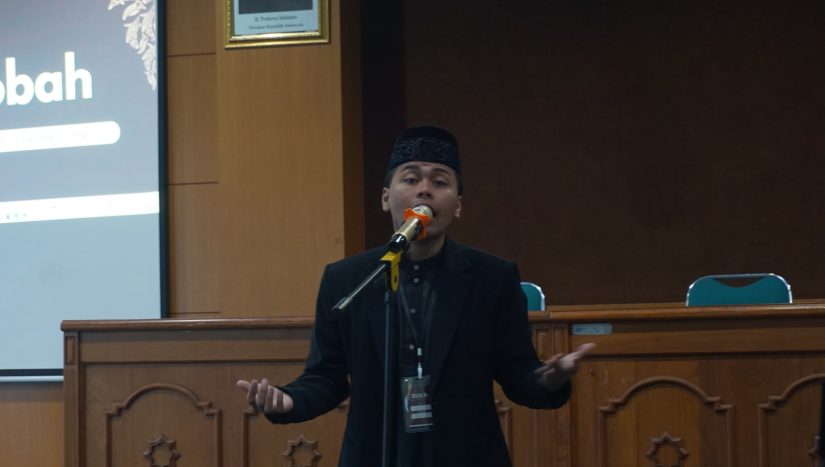
Behind the spotlight of national and international achievements lies a long journey of perseverance lived by Haris Arfakhsyad, a student of Arabic Literature of FIB UGM who has become known for his outstanding performance in Arabic public speaking. He has won first place in the Arabic Fair organized by UNS Surakarta, second place at the international level in GEKA 7 held by UMY Yogyakarta, and second place in FIKAR 12 hosted by UPI Bandung. But beyond the trophies and podiums, his story is about the courage to rise again after an early setback.
That journey began back in the third grade of elementary school at a Madrasah Ibtidaiyah. During a Qur’anic preaching competition organized by the Ministry of Religious Affairs in Bangkalan, his teachers and parents encouraged the shy and timid boy to compete. He agreed. He trained diligently, memorized his speech, and prepared himself for the stage. Yet, fate took a different turn. Halfway through his performance, he suddenly forgot his lines and had to end his speech abruptly. Tears streamed down his face as he whispered to his father, “Dad, I want to go home. I must have lost.”
The experience left him shaken, and for a time, he refused to enter any competitions. But a year later, encouraged once again by his mother, he decided to give it another try. This time, he placed third, a small victory that reignited his spirit. From that moment on, his passion for public speaking slowly grew stronger. By the time he entered high school, he had developed a deep interest in Arabic speeches. Failures came often, but each setback taught him resilience and shaped the speaker he would become. Eventually, he claimed his first victory in an Arabic speech contest organized by the Ministry of Religious Affairs in Jember—an achievement that fueled his path toward national and even international stages.
His success, however, did not come by chance. It was the product of discipline and consistent preparation. He began every competition by carefully crafting a script that matched the given theme. Once the text was ready, he memorized it word for word, practiced his gestures and intonation, and rehearsed in front of teachers, friends, or family to gather feedback. This routine became his formula for growth, one he still relies on today.
The road to victory, of course, was not without obstacles. In fact, failures far outnumbered his wins. “I always believe that every difficulty comes with ease. Never think poorly of your own effort,” he said. For him, failure was not the end, but the best teacher and the foundation for future achievements.
Support from his parents, teachers, and friends also played a pivotal role. “The prayers of my parents are the key,” he stated firmly. Competitions also gave him the opportunity to meet new peers—talented, inspiring individuals who became part of his journey. For him, those connections are among the most meaningful rewards.
When asked what qualities are most important to compete at the national level, his answer was straightforward yet powerful: a willingness to keep learning and improving. “Never be satisfied too soon. Those who want to grow will not stop at a single achievement,” he explained. Humility and optimism, he added, are equally vital pillars for success.
The toughest moments came when he lost repeatedly, with no victories to hold onto. At times, he thought about giving up. But again, the faith and encouragement of his parents lifted him back up. “Great people are not those who never fail, but those who refuse to quit despite repeated failures,” he reflected.
As he closed his story, he shared a message for fellow students: that every person is born with their own strengths and weaknesses, and what sets us apart is our willingness to keep improving ourselves. “Whoever strives with sincerity will succeed,” he said, quoting the well-known Arabic proverb, man jadda wajada.
[Public Relations of FIB UGM, Candra Solihin]

